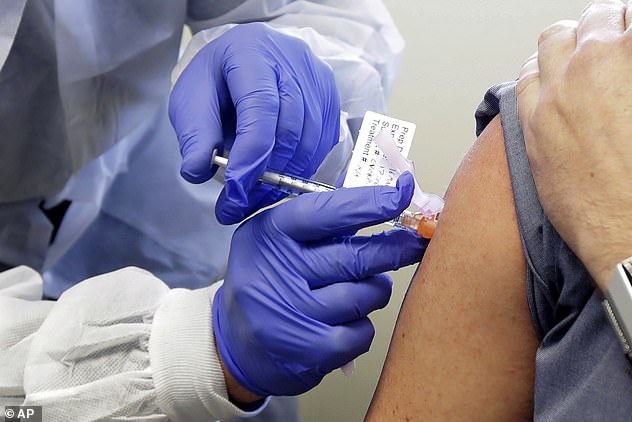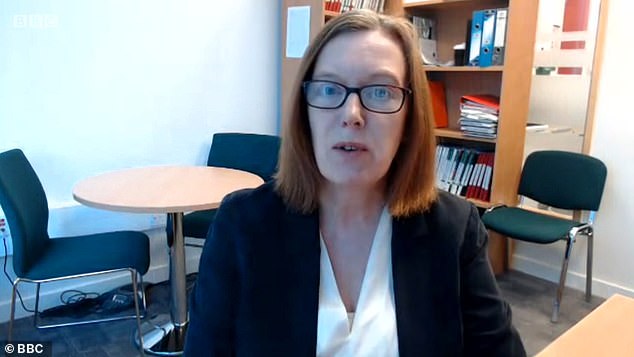AstraZeneca begins final trials of Oxford University coronavirus vaccine enrolling 50,000 people worldwide and 30,000 in the US as company signs £15million manufacturing deal
- Thousands volunteers already being injected with jab in UK, Brazil, South Africa
- Preliminary data from phase 3 trials expected ‘soon’, said lead jab researcher
- Developers say they hope to deliver the vaccine to vulnerable by end of the year
The world may be one step closer to getting a coronavirus jab after Oxford University’s vaccine candidate entered its final stage of tests in the US.
UK drug giant AstraZeneca, which owns the rights to the vaccine, said it had enrolled 30,000 American volunteers to take part in its phase three clinical trial.
It now means 50,000 people worldwide are taking part in studies to see whether the jab – known as AZD1222 – can actually prevent people getting infected with Covid-19.
Thousands of volunteers have already been injected with the experimental drug in the UK, Brazil and South Africa and are being monitored by scientists.
Oxford’s Professor Sarah Gilbert, the brains behind the jab, said preliminary data from trials in these countries could be expected in the coming weeks.
Cambridge-based AstraZeneca said further trials are planned in Japan, where there has been a deadly second wave, and Russia, where there have been a million cases.
AstraZeneca and Oxford scientists have repeatedly promised to deliver the vaccine to the most vulnerable groups to Covid-19 by the end of the year.
Meanwhile, the British drugmaker today struck a £15million deal with Oxford Biomedica to mass-produce the vaccine if it is proven to be effective.
Gene and cell therapy firm Oxford Biomedica will be the sole manufacturer of the vaccine in Britain for 18 months.
AstraZeneca has also struck deals with manufacturers in China, the US, and across Europe as it looks to supply the entire world with the Oxford jab.

Nobel Prize-winning scientists are among 100 experts calling for healthy people to be infected with coronavirus in a bid to speed up the development of vaccines (file)
Oxford Biomedica says it will receive £15m as a capacity reservation fee, plus as much as £35m to make multiple large-scale batches of the vaccine if it works.
Early trials have shown promising results, with tests showing the vaccine is safe to use in humans and appears to provoke an immune response. But data that proves it protects people is not expected until later this year.
To prove without doubt that it protects people from infection, vaccines need to go through rigorous phase three trials.
In these tests the vaccine is being given to tens of thousands of people in real-world environments to see if it stops them from catching Covid-19 in the community.
The Oxford scientists behind the jab had to move their studies abroad over the summer – to South Africa and Brazil where Covid-19 is still rife – to speed up the trials.
There are not enough people catching the virus in the UK anymore to be able to reliably test whether the jab is working.
Professor Sarah Gilbert, who is leading the Oxford team, is confident the jab could be ready for the most vulnerable people in society by the end of the year.
She announced this week that preliminary data from the phase three trials would be presented to regulators soon.
The team have genetically engineered a virus to look like the coronavirus — to have the same spike proteins on the outside — but be unable to cause any infection inside a person.
This virus, weakened by genetic engineering, is a type of virus called an adenovirus, the same as those which cause common colds, that has been taken from chimpanzees.
UK Health Secretary Matt Hancock says frontline health and care workers, and those at an increased risk of serious disease, including elderly care homes residents, will be first in line to get access to a vaccine.
Over-50s and those with heart and kidney disease will be next, according to Mr Hancock, who said health bosses were also considering fast-tracking access for people from BAME backgrounds, who are disproportionately affected by Covid-19.
It’s more likely the average person will get their hands on a Covid-19 sometime in early 2021, according to the UK’s vaccine tsar, Kate Bingham.
Mass-manufacturing is already under way, however, so that the vaccine can be produced as quickly as possible.
AstraZeneca claims it can manufacture two billion doses by summer 2021. The US has already ordered 300million doses and the UK has pre-purchased 100million.
It emerged last week that Number 10 is drawing up emergency plans now in case of a scientific breakthrough before Christmas, officials said.
The new rules being drafted will not shortcut the path a vaccine must take before it is approved for human use, and rigorous clinical trials must still be completed.
It is intended, instead, to speed up the approval process by giving the UK’s Medicines and Healthcare products Regulatory Agency (MHRA) the power to issue a ‘temporary authorisation’ without waiting for the jab to be fully licensed by Europe.
Rules during the Brexit transition period – which doesn’t end until 2021 – mean any new medicine for coronavirus must be licensed by the European Medicines Agency.
But the new rule – for which officials are holding a three-week consultation – would mean that if scientists prove their vaccine works and is safe, the MHRA could approve it and get it used in Britain before it’s licensed by the European Union.
This will not cut short safety trials or any of the scientific work but will mean less paperwork has to be done before the jab can be used.

Professor Sarah Gilbert, who is leading the Oxford team, is confident the jab could be ready for the most vulnerable people in society by the end of the year
The rules are being drafted now in case a working vaccine is found before the end of the year, while the Brexit transition period is still going.
Drug manufacturers are so hopeful that their jabs will work that they are already manufacturing millions of them without knowing whether they will be used.
As well as speeding up the process of getting it from labs to patients, the British Government is planning to speed up the vaccination programme once it starts.
It will do this by training huge numbers of staff to give out the vaccines so there can be a constant flow of jabs being administered.
More doctors and nurses will be given the relevant training and health workers in other parts of the NHS may also be trained up.
Student doctors and nurses, and staff such as midwives, paramedics and physiotherapists could be among the newly trained staff.
There are around 1.1million people working in the NHS and officials say ‘no options are off the table’ in who they could train up.
Everyone who is included in the programme will go through a ‘robust training programme’, the Department of Health said.
Ministers are also reported to be considering drive-through vaccine clinics which work in a similar way to the regional coronavirus testing centres.
People could be able to drive to centres specially set up – possibly in GP surgery car parks, for example – and get the vaccine without having to go into a clinic or hospital.
This could make the process faster and make social distancing easier. The car park plan was drawn up for flu vaccinations in the coming months, The Times reported, but it’s possible that it could be used for a Covid-19 jab in future.
